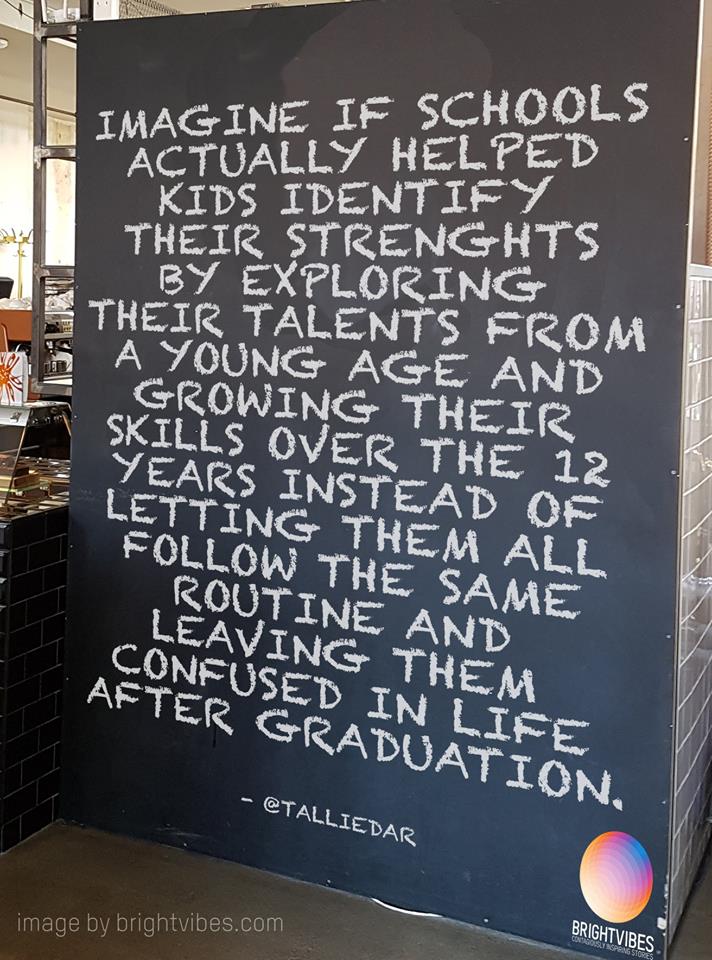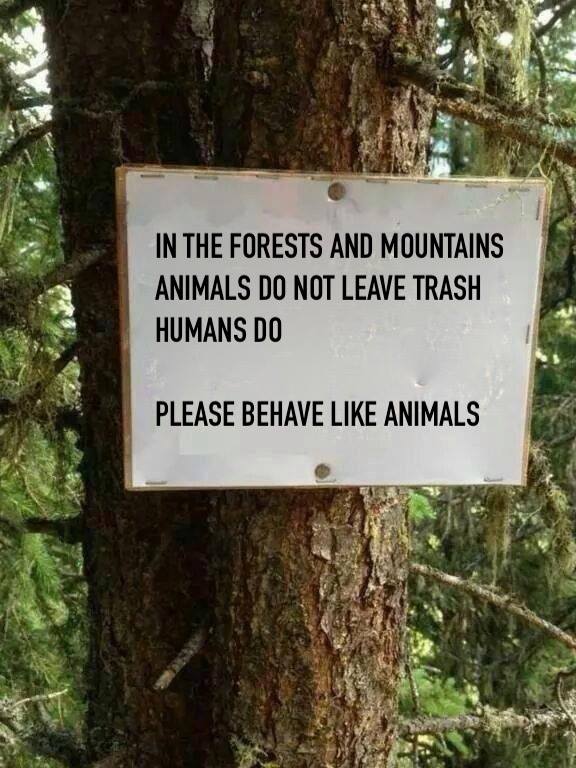
Imagine If Schools…


Tom's Blog on Life and Livingness

The insults of age had been piling up for so long that I was almost numb to them. The husband (when I still had one): “You’re not going out in that sleeveless top?” The grandchild: “Nanna, why are your teeth grey?” The pretty young publisher tottering along in her stilettos: “Are you right on these stairs, Helen?” The flight attendant at the boarding gate: “And when you do reach your seat, madam, remember to stow that little backpack riiiight under the seat in front of you!” The grinning red-faced bloke who mutters to the young man taking the seat beside me: “Bad luck, mate.” The armed child behind the police station counter unable to conceal her boredom as I describe the man in a balaclava, brandishing a baton, who leapt roaring out of the dark near the station underpass and chased me and my friend all the way home: “And what were you scared of? Did you think he might hit you with his umbrella?”
Really, it is astonishing how much shit a woman will cop in the interests of civic and domestic order.
But last spring I got a fright. I was speaking about my new book to a university lecture theatre full of journalism students. I had their attention. Everything was rolling along nicely. Somebody asked me a question and I looked down to collect my thoughts. Cut to the young lecturer’s face surprisingly close to mine. “Helen,” he murmured, “we’re going to take you to the medical clinic.” What? Me?
Apparently, in those few absent moments, of which I still have no memory, I had become confused and distressed; I didn’t know where I was or why I was there. He thought I might be having a stroke.
The rest of that afternoon I lay at my ease in an Emergency cubicle at the Royal Melbourne, feeling strangely light-hearted. I kept thinking in wonder, I’ve dropped my bundle. All scans and tests came up clear. Somebody asked me if I’d ever heard of transient global amnesia. I was home in time for dinner.
Next morning I took the hospital report to my GP. “I’ve been worried about you,” she said. “It’s stress. You are severely depleted. Cancel the rest of your publicity tour, and don’t go on any planes. You need a serious rest.” I must have looked sceptical. She leant across the desk, narrowed her eyes, and laid it on the line: “Helen. You. Are. 71.”
I went home and sulked on the couch for a week, surveying my lengthening past and shortening future.
I had known for years, of course, that beyond a certain age women become invisible in public spaces. The famous erotic gaze is withdrawn. You are no longer, in the eyes of the world, a sexual being. In my experience, though, this forlornness is a passing phase. The sadness of the loss fades and fades. You pass through loneliness and out into a balmy freedom from the heavy labour of self-presentation. Oh, the relief! You have nothing to prove. You can saunter about the world in overalls. Because a lifetime as a woman has taught you to listen, you know how to strike up long, meaty conversations with strangers on trams and trains.
But there is a downside, which, from my convalescent sofa, I dwelt upon with growing irritation. Hard-chargers in a hurry begin to patronise you. Your face is lined and your hair is grey, so they think you are weak, deaf, helpless, ignorant and stupid. When they address you they tilt their heads and bare their teeth and adopt a tuneful intonation. It is assumed that you have no opinions and no standards of behaviour, that nothing that happens in your vicinity is any of your business. By the time I had got bored with resting and returned to ordinary life, I found that the shield of feminine passivity I had been holding up against this routine peppering of affronts had splintered into shards.
One warm December evening, a friend and I were strolling along Swanston Street on our way out to dinner. The pavement was packed and our progress was slow. Ahead of us in the crowd we observed with nostalgic pleasure a trio of teenagers striding along, lanky white Australian schoolgirls in gingham dresses and blazers, their ponytails tied high with white ribbons.
One of the girls kept dropping behind her companions to dash about in the moving crowd, causing mysterious jolts and flurries. Parallel with my friend and me, an Asian woman of our age was walking by herself, composed and thoughtful. The revved-up schoolgirl came romping back against the flow of pedestrians and with a manic grimace thrust her face right into the older woman’s. The woman reared back in shock. The girl skipped nimbly across the stream of people and bounded towards her next mark, a woman sitting on a bench – also Asian, also alone and minding her own business. The schoolgirl stopped in front of her and did a little dance of derision, flapping both hands in mocking parody of greeting. I saw the Asian woman look up in fear, and something in me went berserk.
In two strides I was behind the schoolgirl. I reached up, seized her ponytail at the roots and gave it a sharp downward yank. Her head snapped back. In a voice I didn’t recognise I snarled, “Give it a rest, darling.” She twisted to look behind her. Her eyes were bulging, her mouth agape. I let go and she bolted away to her friends. The three of them set off at a run. Their white ribbons went bobbing through the crowd all the way along the City Square and up the steps of the Melbourne Town Hall, where a famous private school was holding its speech night. The whole thing happened so fast that when I fell into step beside my friend she hadn’t even noticed I was gone.
Everyone to whom I described the incident became convulsed with laughter, even lawyers, once they’d pointed out that technically I had assaulted the girl. Only my 14-year-old granddaughter was shocked. “Don’t you think you should have spoken to her? Explained why what she was doing was wrong?” As if. My only regret is that I couldn’t see the Asian woman’s face at the moment the schoolgirl’s head jerked back and her insolent grin turned into a rictus. Now that I would really, really like to have seen.
By now my blood was up. At Qantas I approached a check-in kiosk and examined the screen. A busybody in uniform barged up to me, one bossy forefinger extended. “Are you sure you’re flying Qantas and not JetStar?” Once I would have bitten my lip and said politely, “Thanks. I’m OK, I think.” Now I turned and raked him with a glare. “Do I look like somebody who doesn’t know which airline they’re flying?”
A young publicist from a literary award phoned me to deliver tidings that her tragic tone indicated I would find devastating: alas, my book had not been short-listed. “Thanks for letting me know,” I said in the stoical voice writers have ready for these occasions. But to my astonishment she poured out a stream of the soft, tongue-clicking, cooing noises one makes to a howling toddler whose balloon has popped. I was obliged to cut across her: “And you can stop making those sounds.”
After these trivial but bracing exchanges, my pulse rate was normal, my cheeks were not red, I was not trembling. I hadn’t thought direct action would be so much fun. Habits of a lifetime peeled away. The world bristled with opportunities for a woman in her 70s to take a stand. I shouted on planes. I fought for my place in queues. I talked to myself out loud in public. I walked along the street singing a little song under my breath: “Back off. How dare you? Make my day.” I wouldn’t say I was on a hair-trigger. I was just primed for action.
I invited an old friend to meet me after work at a certain city bar, a place no longer super-fashionable but always reliable. We came down the stairs at 4.30 on a Friday afternoon. Her silver hair shone in the dim room, advertising our low status. The large space was empty except for a small bunch of quiet drinkers near the door. Many couches and armchairs stood in appealing configurations. We walked confidently towards one of them. But a smiling young waiter stepped out from behind the bar and put out one arm. “Over here.” He urged us away from the comfortable centre of the room, with its gentle lamps and cushions, towards the darkest part at the back, where several tiny cafe tables and hard, upright chairs were jammed side-on against a dusty curtain.
I asked, “Why are you putting us way back here?”
“It’s our policy,” he said, “when pairs come in. We put them at tables for two.”
Pairs? Bullshit. “But we don’t want to sit at the back,” I said. “There’s hardly anybody here. We’d like to sit on one of those nice couches.”
“I’m sorry, madam,” said the waiter. “It’s policy.”
“Come on,” said my pacific friend. “Let’s just sit here.”
I subsided. We chose a slightly less punitive table and laid our satchels on the floor beside us. With tilted head and toothy smile the waiter said, “How’s your day been, ladies?”
“Not bad, thanks,” I said. “We’re looking forward to a drink.”
He leant his head and shoulders right into our personal space. “And how was your shopping?”
That was when I lost it.
“Listen,” I said with a slow, savage calm. “We don’t want you to ask us these questions. We want you to be cool, and silent, like a real cocktail waiter.”
The insult rolled off my tongue as smooth as poison. The waiter’s smile withered. Then he made a surprising move. He put out his hand to me and said pleasantly, “My name’s Hugh.”
I shook his hand. “I’m Helen. This is Anne. Now, in the shortest possible time, will you please get two very dry martinis onto this table?”
He shot away to the bar. My friend with the shining silver hair pursed her lips and raised her eyebrows at me. We waited in silence. Soon young Master Hugh skidded back with the drinks and placed them before us deftly, without further attempts at small talk. We thanked him. The gin worked its magic. For an hour my friend and I talked merrily in our ugly, isolated corner. We declined Hugh’s subdued offer of another round, and he brought me the bill. He met my eye. Neither of us smiled, let alone apologised, but between us flickered something benign. His apparent lack of resentment moved me to leave him a rather large tip.
On the tram home I thought of the young waiter with a chastened respect. It came to me that to turn the other cheek, as he had done, was not simply to apply an ancient Christian precept but also to engage in a highly sophisticated psychological maneuver. When I got home, I picked up Marilynne Robinson’s novel Gilead where I’d left off and came upon a remark made by Reverend Ames, the stoical Midwestern Calvinist preacher whose character sweetens and strengthens as he approaches death: “It is worth living long enough,” he writes, in a letter to the son born to him in his old age, “to outlast whatever sense of grievance you may acquire.”
I take his point. But my warning stands. Let blood technicians look me in the eye and wish me good morning before they sink a needle into my arm. Let no schoolchild in a gallery stroll between me and the painting I’m gazing at as if I were only air. And let no one, ever again, under any circumstances, put to me or any other woman the moronic question, “And how was your shopping?”
HELEN GARNER
Helen Garner is an award-winning novelist, short-story writer, screenwriter and journalist. Her books include Monkey Grip, The Children’s Bach, The Spare Room and This House of Grief.



My daughter is 16 and like all teens deals with social drama and ups and downs. I want her to have a cell phone for safety, but last year I began to realize that she was using it for much more than that. She was staying up late at night texting and on social media, and the beautiful daughter I know and love was, quite frankly, becoming awful to live with.
After investigating her hours of late night phone use (which for a technology challenged mom like myself was no easy task), my husband and I decided it was time for us to start putting her device in our room at bedtime. I honestly had no idea how much this decision would impact her. After she blew up in anger, she began sobbing and puddled on the floor. As I held her, I just listened. Listened to all the worries and fears of fitting in and keeping up, but there was something even more alarming keeping her up at night… …my daughter had been counseling another teen late at night who was suicidal. Her huge heart had been on high alert. She HAD to stay up and be available at all times “in case” her friend needed her.


And tie on signs with twine so as to do less harm to the trees.

This puts a whole new slant on our daily decisions!

I thought tomatoes and bananas were better kept out of hte fridge…
